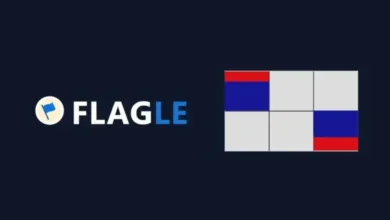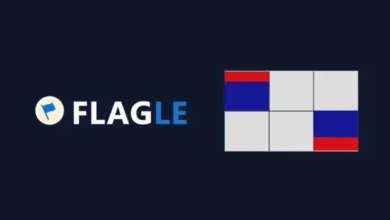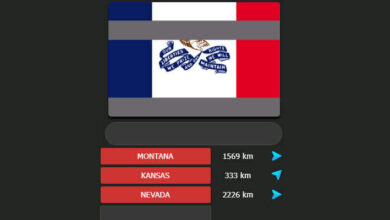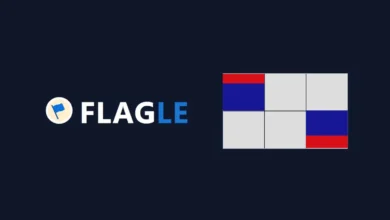Flagle: The Addictive Flag Guessing Game That’s Taking the Internet by Storm
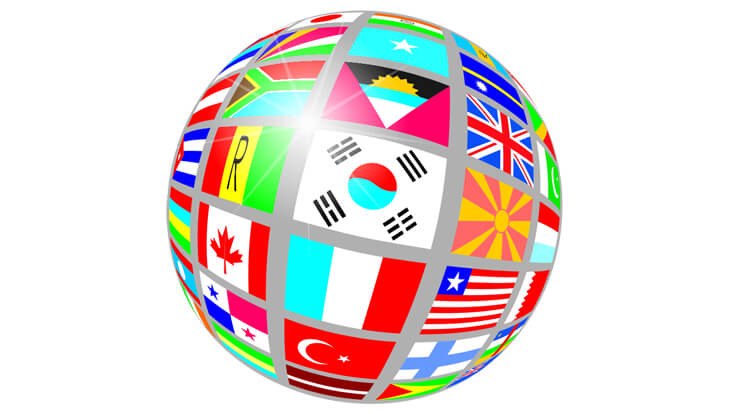
Flagle is an engaging online puzzle game inspired by the global sensation Wordle, but instead of guessing a word, you’re challenged to identify a hidden national flag. Every day, players across the world log in to face a new mystery flag. The challenge lies in using partial visual clues and limited guesses to determine which country’s flag is being displayed.
This game combines fun, learning, and competition—perfect for anyone who loves geography, trivia, or just enjoys daily brain teasers. What makes Flagle so fascinating is its simplicity. You don’t need an account, payment, or download; just open the website, and you’re good to go.
In an age where quick, interactive games dominate the internet, Flagle has carved out its niche by turning the familiar guessing game format into a colorful exploration of world flags.
The Origin and Inspiration Behind Flagle
Flagle was directly inspired by the success of Wordle, a daily word puzzle that took the internet by storm in 2022. Developers saw an opportunity to create something similar—but with a unique twist that catered to visual learners and geography enthusiasts.
The creators of Flagle realized that national flags, like words, carry deep meaning and recognition. Every flag represents history, culture, and identity. Thus, Flagle became not only a game but also an educational tool that promotes global awareness.
The concept grew rapidly on social media platforms like Twitter and Reddit, where users started sharing their daily results and discussing the trickier flags. This sense of community and competition helped Flagle rise in popularity, transforming it from a simple puzzle into a global phenomenon.
How to Play Flagle: A Step-by-Step Guide
Playing Flagle is straightforward but challenging enough to keep you coming back daily. Here’s a simple guide:
- Visit the Flagle website.
You’ll see a blank area where part of a flag is hidden. - Make your first guess.
Choose a country you think the flag might belong to. - Check the visual feedback.
After each guess, Flagle gives you visual hints—portions of the flag are revealed to help you get closer to the answer. - Use geography hints.
Some versions of Flagle display the distance between your guess and the correct country, helping you narrow down your next move. - Continue guessing.
You typically get six attempts to identify the flag correctly.
It’s a simple setup, but the mix of visual deduction, geographical reasoning, and memory makes each round exciting.
Understanding the Rules of Flagle
Flagle’s rules are straightforward: guess the correct country based on the flag shown within the allowed number of attempts. Each incorrect guess unlocks more clues, but you only get a few chances—usually six—to solve it.
The challenge lies in using each clue effectively. If you guess incorrectly, Flagle might reveal a color, symbol, or stripe from the hidden flag. You’ll need to recall your knowledge of world flags or identify distinctive patterns—like the red circle of Japan or the maple leaf of Canada.
Your final score depends on how quickly you identify the correct flag. The fewer guesses you use, the better your score.
Visual Clues: How Flagle Tests Your Flag Knowledge
What makes Flagle truly unique are the visual clues it provides. Rather than using words or letters, the game reveals fragments of a flag—stripes, colors, or shapes—that you must interpret.
For example, you might first see just a small green rectangle. That could belong to dozens of countries. As you guess and reveal more, new patterns emerge—a star, a cross, or a tricolor layout. Suddenly, the answer starts to take shape.
Flagle rewards observation and memory. Players who’ve studied world flags—or even seen them in passing during sports events or travel—often find themselves at an advantage. It’s a puzzle that trains your eye as much as your brain.
Tips and Tricks to Win Flagle Every Time
Want to improve your Flagle game? Here are some practical strategies:
- Start with major flags. Try guessing larger or more well-known countries first.
- Observe patterns carefully. Look for unique shapes—like stars, suns, or coats of arms.
- Think geographically. If distance clues are available, use them to narrow your range of guesses.
- Memorize flag groups. Many regions share color schemes—like red, white, and blue in Europe.
- Stay calm. Don’t rush your guesses; analyze what each new piece reveals.
Over time, you’ll notice improvement—not just in the game but in your general awareness of world flags.
Why Flagle Has Become So Popular
The magic of Flagle lies in its simplicity, educational value, and social aspect. Much like Wordle, it offers one new challenge each day, encouraging players to compete with friends or share results online.
Social media has amplified its popularity. Users love posting their daily scores, often using emojis or flag icons to represent progress. It’s not just a game; it’s a global geography movement.
Another reason for its success is accessibility. Anyone with an internet connection can play, regardless of language or location. Plus, it takes less than five minutes a day—perfect for busy people who still want a daily dose of fun.
Comparing Flagle with Wordle: What Makes It Different?
Both Flagle and Wordle share the same core idea: limited guesses, daily challenges, and simple design. However, while Wordle tests linguistic intuition, Flagle tests visual memory.
Wordle depends on vocabulary and deduction; Flagle relies on recognition and observation. You’re not forming words—you’re identifying patterns. It’s a subtle but refreshing twist that appeals to a different type of player.
Another major difference is the educational angle. Flagle teaches players about national flags, geography, and cultural identity in a fun, non-traditional way.
Educational Benefits of Playing Flagle
Flagle is more than entertainment—it’s an educational powerhouse. Each puzzle helps you learn about different nations and their symbols. Over time, you’ll naturally memorize flags and their meanings, enhancing your global literacy.
Teachers even recommend it as a classroom activity. It encourages visual learning, critical thinking, and curiosity about world cultures. Students can connect flags to their historical or geographical contexts, turning simple play into meaningful education.
How Flagle Sharpens Your Geography Skills
Beyond recognizing flags, Flagle also strengthens geographical reasoning. When you guess incorrectly, the game sometimes gives distance feedback, showing how far your guess is from the correct country.
This feature subtly teaches world geography. You begin understanding spatial relationships between countries, continents, and regions. In short, Flagle doesn’t just test your flag knowledge—it makes you a better global thinker.
Common Mistakes Players Make in Flagle
Even experienced players slip up sometimes. Here are a few common errors:
- Confusing similar flags (like Romania and Chad).
- Ignoring small symbols that differentiate flags.
- Guessing too quickly without analyzing color patterns.
- Forgetting that territories and smaller nations have unique flags too.
Avoiding these mistakes requires patience and attention to detail.
Flagle Strategies: How to Narrow Down the Right Country
If you’re serious about winning Flagle consistently, develop a system:
- Start broad. Guess large or common countries first.
- Focus on regions. Use the distance clues to narrow your area.
- Look for shapes. Circles often hint at Japan or Bangladesh; stars might point to the U.S., China, or Turkey.
- Eliminate duplicates. Rule out countries with similar patterns as you go.
Over time, you’ll start spotting clues faster and improving your accuracy.
Flagle Variations and Community Challenges
The Flagle community is constantly growing, with fans creating their own variations—like Flagle Unlimited or Worldle Flags—to keep the fun going. Online groups share hints, host flag-guessing tournaments, and discuss world history behind each design.
This vibrant community adds another layer of excitement, proving that Flagle is more than a game—it’s a shared experience for trivia lovers worldwide.
Why You Should Try Flagle Today
If you’re looking for a fun way to test your memory, learn geography, and challenge your brain, Flagle is the perfect game for you. It’s free, quick, and surprisingly addictive. You might start playing for fun, but soon you’ll find yourself recognizing every flag at the Olympics or in news reports.
Flagle combines education, entertainment, and competition in one simple interface. Whether you’re a student, traveler, or just someone who loves puzzles, Flagle is guaranteed to brighten your day.
Conclusion
Flagle proves that learning doesn’t have to be boring. With its simple gameplay, colorful visuals, and educational value, it’s more than just a guessing game—it’s a global learning experience. From daily challenges to flag trivia mastery, Flagle has something for everyone.
So, the next time you want a quick mental workout, skip scrolling through social media and open Flagle instead. Who knew guessing flags could be this much fun?
FAQs
1. What is Flagle?
Flagle is an online puzzle game where you guess a hidden national flag using visual clues, inspired by the format of Wordle.
2. How do I play Flagle?
You guess countries based on flag portions revealed after each attempt. You get limited guesses to find the correct country.
3. Is Flagle free to play?
Yes, it’s completely free and doesn’t require any downloads or sign-ups.
4. Can I play Flagle on my phone?
Absolutely! Flagle is mobile-friendly and works on all browsers.
5. How often does Flagle update?
A new flag puzzle appears every day, keeping players engaged and learning continuously.

